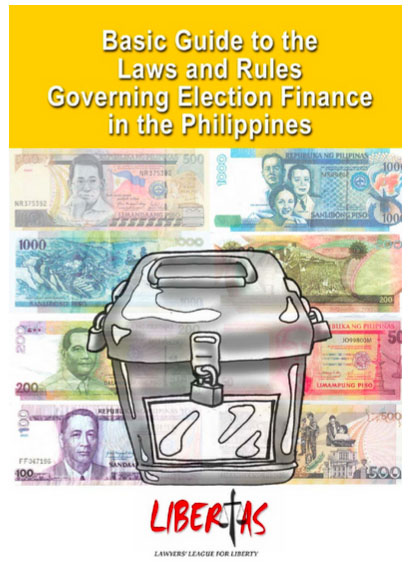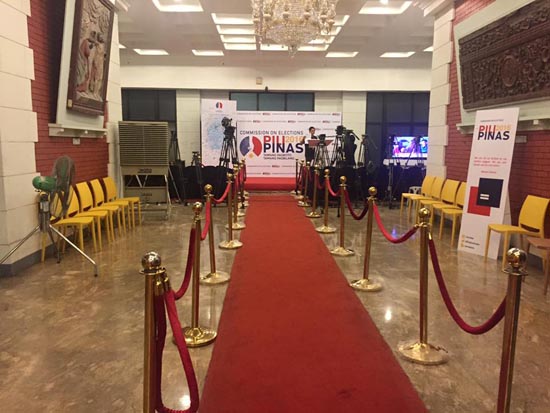Can we trust politicians with the public purse if they are so epal ?
(Download the ebook on Basic Guide to the Laws and Rules Governing Election Finance in the Philippines.)
“Can we trust them with the public purse?.” This was a question posed in “Net worth vs. P6.7-B pol ads bill: Top bets in debt, deficit spending?”, an article of the Philippine Center for Investigative Journalism.
Can you trust this candidate who keeps showing blatant announcements about their activities? Someone will say that it is not against the law to spend like an “epal” before the official campaign period. But I want you to think hard. These “epal” candidates would be “quite seriously and deeply — and gravely for the nation — awash in political debt.” Just go through the hashtag #epalwatch on twitter and facebook.
Donating to candidates in elections whom you support is a public good, and a public duty of all voters says Commissioner Luie Tito F. Guia of the Commission on Elections, in a previous interview with PCIJ. “This is key, he said, to making elections inclusive and accountable. But transparency — who donated how much to which candidates — is yet a third important feature of good elections, Guia added.”
Think about how much that cellphone, rubber shoes, tarpulin, caps. disaster kits with the epal’s photo in it cost? Add those epal costs to the campaign spending alloted per candidate. Who is this epal candidate beholden to? How much donation has he received so far? Transparency in campaign spending even before the campaign period is a must in choosing a candidate.
Do you really know how much campaign spending is allotted per candidate?
Among other things, Blog Watch focuses on Voters Education in Campaign Finance. We will flash pertinent Campaign Finance Laws in future articles so voters will be vigilant. We hold these public officers accountable to the people. We need to make sure that our candidates are transparent as to the sources of their campaign money and the true extent of their elections spending as this would impact directly on the candidates’ governance upon assumption to office.
Election spending must be kept at a minimum. Article IX-C Section 2 of the Constitution states that the Commission on Elections to recommend to Congress measures that would minimize election spending. The governing statutes are:
- Batas Pambansa Blg. 881 [1985] or the Omnibus Election Code (OEC) particularly Sections 68, 81, 86, 88. 89, 94, 85, 96, 97, 98, 99, 100, 102-106, 109-111, 261 (a) (b) (j) (o) (v) and (w), 262, 263 and 264;
- Republic Act No. 6646 or the Electoral Reforms Law of 1987, particularly section 28;
- Republic Act No. 7166 or the Synchronized Election Law, particularly Section 13 and 39; and
- Republic Act No. 9006 or the Fair Election Act, particularly Sections 3, 6, and 11.
There is too much information at this point but take note of this:
Expenditure limits per registered voter in the constituency a candidate is running
- Php 3.00 – individual candidate supported by political party
- Php 5.00 – individual candidat not supported or nominated by political party
- Php 5.00 – political parties
- PhP 10.00 – candidates for President or Vice President
There is a lot that the public has to learn on Campaign Finance, such as Sources of Funds, the Expenditure side, Recording and Reportorial Requirements, Use of Public Funds and Properties, and Effects of Violation of Election Finance Laws and Rules.
We want our candidate to be transparent. You want your candidate to have integrity.
Media gives little coverage to Campaign Finance. It is not given enough importance unlike voting and counting procedures. The state of campaign finance is such that it is comprehensive but outdated. The laws are largely ignored with insufficient enforcement capability and mechanism. At the end of the elections, we celebrate the victory, look at disputes, but forget about the finances.
Campaign Finance issues lie at the heart of electoral reform in the Philippines. Law Reform is in order.
- Re-definition of candidate and campaign reforms
- Rationalizing existing campaign finance laws like expenditure limits
- Publication of candidates reports
- Consider state subsidy, to make parties public institutions that may be publicly audited
- Institutionalization of political parties as handlers of campaign finance
What about you, the voters? We all play a role. Media has the responsibility to accurately report political and technical aspect of elections and plays a vital role in informing voters and holding candidates, political parties, and election authorities accountable.
Let’s do our part. Read up on Campaign Finance Laws. Be vigilant. Report, if there is evidence, on violation of the Election Finance laws. Here is a start.
Download or read Basic Guide to the Laws and Rules Governing Election Finance in the Philippines.
Source of Image & Campaign Finance Laws: “Basic Guide to the Laws and Rules Governing Election Finance in the Philippines” by Lawyer’s League for Liberty.
“Epal” is slang for “mapapel,” a Filipino term for attention grabbers or people who crave a role (papel) in affairs that are not necessarily theirs to handle or decide. The word “epal” became a buzzword when President Benigno Aquino III initiated a shame campaign against such annoying public officials. It is a common practice among public officers, whether elected or appointed, to append their names to public works projects which were either funded or facilitated through their office. This gallery shows these “mapapel” officials and/or tarpaulins or campaign paraphernalia even before the official campaign period.


